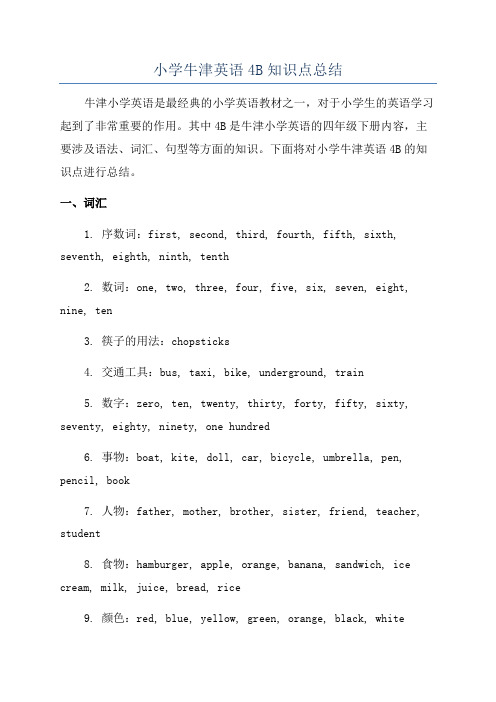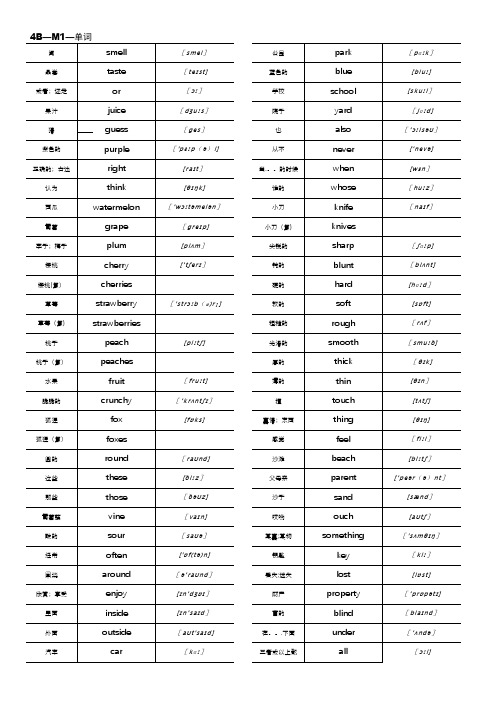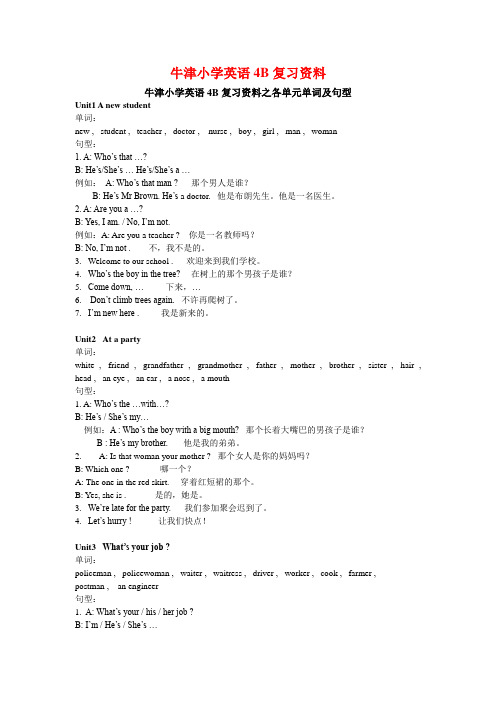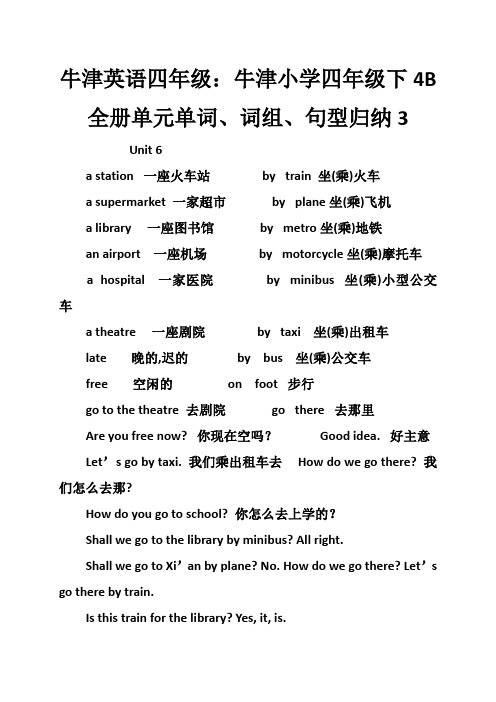上海牛津小学四年级英语4B单元知识点归纳汇总
小学牛津英语4B知识点总结

小学牛津英语4B知识点总结牛津小学英语是最经典的小学英语教材之一,对于小学生的英语学习起到了非常重要的作用。
其中4B是牛津小学英语的四年级下册内容,主要涉及语法、词汇、句型等方面的知识。
下面将对小学牛津英语4B的知识点进行总结。
一、词汇1. 序数词:first, second, third, fourth, fifth, sixth, seventh, eighth, ninth, tenth2. 数词:one, two, three, four, five, six, seven, eight, nine, ten3. 筷子的用法:chopsticks4. 交通工具:bus, taxi, bike, underground, train5. 数字:zero, ten, twenty, thirty, forty, fifty, sixty, seventy, eighty, ninety, one hundred6. 事物:boat, kite, doll, car, bicycle, umbrella, pen, pencil, book7. 人物:father, mother, brother, sister, friend, teacher, student8. 食物:hamburger, apple, orange, banana, sandwich, ice cream, milk, juice, bread, rice9. 颜色:red, blue, yellow, green, orange, black, white10. 音乐乐器:piano, violin, guitar, drums, flute11. 动物:dog, cat, monkey, panda, rabbit, bird, fish, elephant, tiger, lion12. 日期:Monday, Tuesday, Wednesday, Thursday, Friday, Saturday, Sunday二、语法1.一般现在时:主语+动词原形/第三人称单数现在时形式;e.g. I like music. He likes music.2. 物主代词:my, your, his, her, itse.g. This is my book.3.反意疑问句:陈述部分否定,疑问部分用否定的形式;陈述部分肯定,疑问部分用肯定的形式。
上海牛津英语四年级下4B语法总结

上海牛津英语四年级下4B语法总结冠词/不定冠词:➢不定冠词:a/an 表示某一个a辅音开头的名词前an元音开头的名词前an + apple 、orange、egg、elephant、insect 、umbrella、old、hour、honest➢定冠词:the表示特定的这个或那个the sun定冠词the用于特指、独一无二(the sun)、形容词最高级、序数词、海洋江河山脉岛屿等专有名词(the Yangze River)、方位词、乐器(play th piano)、时间(in the morning)➢零冠词:球类运动(play football)、时间(at night)、季节月份星期(in spring ,in September, on Monday)、名词复数:➢一般情况,单词变复数只需加s,如book—books, friend→friends; cat→cats➢凡是以s、ss, z、x、ch、sh或o结尾的词,后面只需加es。
如;bus→buses;fox→foxes;等。
➢结尾以y ,而y之前是元音字母的话,只需加s 就行了。
如;toy—toys、boy—boys.如果y前是辅音,去y加ies➢以-f或-fe结尾的名词,多为将-f或-fe改变为-ves。
例:knife→knives; life→lives;leaf→leaves。
反例:roof→roofs➢以o 结尾的词,有生命加es 如;potato--- potatoes。
但没有生命的加s (除个别特殊的)➢不规则变化单词child---children tooth---teeth man…men woman…women mouse…mice foot…feet➢单复数相同的词;fish sheep deer ……➢如果是不可数,例如液体,粉状的没有单复数形式。
如water milk jam meat flour rice power paper cloud honey sugar rice bread salt air juice pepper grass work句子时态表示现在情况的有一般现在时和现在进行时。
牛津小学英语4B单元知识归纳

Unit1 A new student一.words:new新的student学生boy 男孩woman妇女;女人teacher老师nurse护士doctor医生girl女孩man男人our 我们的school学校who谁who’s=who is是谁tree树climb攀登;攀爬sir先生you’re=you are你是,你们是right对的,正确的二.Phases:welcome to our school 欢迎到我们学校来come down下来 a new student一个新学生in the tree在树上let me see让我看看climb trees 爬树over there在那边you’re right你是正确的三.SentencesHello,I’m Ben. I’m new here.你好,我是本。
Hello,I’m Gao shan. 你好,我是高山。
Welcome to our school.欢迎到我们学校来。
Thank you.谢谢Who’s that boy?那个男孩是谁?He’s Mike.He’s a student.他是马克。
他是一个学生。
Who’s that woman?那个妇女是谁?She’s Miss Li.she’s a teacher.她是李小姐,她是一个老师。
Excuse me,are you a teacher?打扰你一下,你是一个老师吗?No,I’m not.I’m a nurse.不,我不是,我是一个护士。
Unit2 At a party一.Words:brother 兄,弟sister 姐,妹white 白色的,白色friend 朋友grandfather (外)祖父father 父亲grandmother (外)祖母mother 母亲party 聚会with 有,具有…特征eye 眼睛which 哪一个,哪一些in(表示服饰等)穿着hair 头发head 头ear 耳朵nose 鼻子mouth 嘴o’clock …点钟we 我们we’re = we are 我们是hurry 赶快wrong 错误的二.Phrases:at a party 在一个聚会上which one 哪一个be late for the party 聚会迟到my grandfather 我的爷爷nice to meet you 见到你很高兴be late for school上学迟到let’s hurry 让我们赶快in the car 在汽车里let’s go 让我们走吧you’re wrong 你是错误的on the chair 在椅子上my father’s father 我父亲的父亲the boy with big ears 大耳朵的男孩the girl with a small mouth小嘴巴的女孩the man in a white T-shirt穿白色T恤衫的男人the woman in the car 小汽车里的男人三.SentencesGood evening , Ben . 晚上好,本。
上海版牛津英语4B单词(含音标)与短语整理

4B—M1—单词闻smell [smel]品尝taste [teɪst]或者;还是or [ɔː]果汁juice [dʒuːs]猜guess [ges]紫色的purple ['pɜːp(ə)l] 正确的;右边right [raɪt]认为think [θɪŋk]西瓜watermelon [’wɔːtəmelən]葡萄grape [greɪp] 李子;梅子plum [plʌm]樱桃cherry [’tʃerɪ]樱桃(复)cherries草莓strawberry ['strɔːb(ə)rɪ] 草莓(复) strawberries桃子peach [piːtʃ]桃子(复)peaches水果fruit [fruːt]脆脆的crunchy [’krʌntʃɪ]狐狸fox [fɒks]狐狸(复)foxes圆的round [raʊnd]这些these [ðiːz]那些those [ðəʊz]葡萄藤vine [vaɪn]酸的sour [saʊə]经常often ['ɒf(tə)n]围绕around [ə’raʊnd]欣赏;享受enjoy [ɪn’dʒɒɪ]里面inside [ɪn’saɪd]外面outside [aʊt'saɪd]汽车car [kɑː]公园park [pɑːk]蓝色的blue [bluː]学校school [skuːl]院子yard [jɑːd]也also [’ɔːlsəʊ]从不never [’nevə] 当.。
的时候when [wɛn]谁的whose [huːz]小刀knife [naɪf]小刀(复) knives尖锐的sharp [ʃɑːp]钝的blunt [blʌnt]硬的hard [hɑːd]软的soft [sɒft]粗糙的rough [rʌf]光滑的smooth [smuːð]厚的thick [θɪk]薄的thin [θɪn]摸touch [tʌtʃ]事情;东西thing [θɪŋ]感觉feel [fiːl]沙滩beach [biːtʃ]父母亲parent [’peər(ə)nt]沙子sand [sænd]哎哟ouch [aʊtʃ]某事;某物something ['sʌmθɪŋ]钥匙key [kiː]丢失;迷失lost [lɒst]财产property [’prɒpətɪ] 盲的blind [blaɪnd]在。
牛津小学英语4b复习资料

牛津小学英语4B复习资料牛津小学英语4B复习资料之各单元单词及句型Unit1 A new student单词:new , student , teacher , doctor , nurse , boy , girl , man , woman句型:1. A: Who’s that …?B: He’s/She’s … He’s/She’s a …例如:A: Who’s that man ?那个男人是谁?B: He’s Mr Brown. He’s a doctor. 他是布朗先生。
他是一名医生。
2. A: Are you a …?B: Yes, I am. / No, I’m not.例如:A: Are you a teacher ? 你是一名教师吗?B: No, I’m not .不,我不是的。
3. Welcome to our school . 欢迎来到我们学校。
4. Who’s the boy in the tree?在树上的那个男孩子是谁?5. Come down, …下来,…6. Don’t climb trees again.不许再爬树了。
7. I’m new here .我是新来的。
Unit2 At a party单词:white , friend , grandfather , grandmother , father , mother , brother , sister , hair , head , an eye , an ear , a nose , a mouth句型:1. A: Who’s the …with…?B: He’s / She’s my…例如:A : Who’s the boy with a big mouth?那个长着大嘴巴的男孩子是谁?B : He’s my brother.他是我的弟弟。
2. A: Is that woman your mother ? 那个女人是你的妈妈吗?B: Which one ? 哪一个?A: The one in the red skirt. 穿着红短裙的那个。
沪教版牛津英语四年级OE4BM3U1 背诵内容

牛津4BM3U1 背诵内容一、单词、词组sound(s) / saʊnd/ 声音1.quiet / 'kwaɪət / 安静的quite /kwaɪt/ 十分、相当2.noisy / 'nɔɪzi / 吵闹的(反义词:quiet)3.noise / nɔɪz/ 喧闹声make no noise 不发出噪音4.loud / laʊd / 响的(反义词:low)5.bell(s) / bel / 铃铛bicycle bell 车铃doorbell 门铃wind-bell 风铃6.television(s) / 'telɪvɪʒn / 电视机缩写形式TV7.outside /ˌaʊt'saɪd/ 在外面(反义词:inside 在里面)8.student(s) /'stjuːdnt/ 学生9.thick /θɪk/ 厚的(反义词:thin 薄的)10.crayon(s) / 'kreɪən/ 蜡笔11.string / strɪŋ/ 线(不可数名词) some string12.scissors / 'sɪzəz / 剪刀 a pair of scissors 一把剪刀13.different / 'dɪfrənt/ 不同的(反义词:same /seɪm/ 相同的)14.careful / 'keəfl/ 小心谨慎的、仔细的Be careful! 当心!15.excuse /ɪk'skjuːz/ 原谅Excuse me! 对不起,打扰一下!16.man / mæn/ 男人(复数:m e n)dy / 'leɪdi/ 女士(复数:lad ies)18.awake /ə'weɪk/ 醒着的、清醒的19.puzzled / 'pʌzl d/ 困惑的20.doze [dəʊz] 打瞌睡21.nap / næp/ 小睡have/take a nap 打盹ter / 'leɪtə/ 后来 a week later 一周之后23.unhappy /ʌn'hæpi/ 不高兴的un happy/un kind/un friendly/un helpful un=not24.wheel(s) /wiːl/ 轮子the wheel on the bike 自行车上的轮子动词(原形、现在分词、第三人称单数):25.ring / rɪŋ/ 响(第三人称单数:ring s) (现在分词:ring ing)Is the doorbell ringing? 是门铃在响吗?26.make /meɪk/ 制作(第三人称单数:make s) (现在分词:mak ing)make a wind-bell 制作风铃make two holes in each shape 在每个形状里制作两个洞27.draw /drɔː/ 画画(第三人称单数:draw s) (现在分词:draw ing)draw different shapes on the thick card 在厚卡纸上画不同的形状28.colour / 'kʌlə/ 涂颜色(第三人称单数:colour s) (现在分词:colour ing)colour them with crayons 用蜡笔涂颜色29.cut /kʌt / 剪(第三人称单数:cut s) (现在分词:cu tting)cut out the shapes 把形状剪下cut up 剪碎30.tie / taɪ/ 系(第三人称单数:tie s) (现在分词:t ying)tie the shapes and the bell with some string 用线系上形状和铃铛31.ride /raɪd/ 骑(第三人称单数:ride s) (现在分词:rid ing)ride his bicycle in the S ports P ark骑自行车32.doze /dəʊz/ 读(第三人称单数:doze s) (现在分词:doz ing)Two old ladies are dozing on the bench.33.feel /fiːl/ 感觉到(第三人称单数:feel s) (现在分词:feel ing)feel angry 感到生气34.have / hæv / 有(第三人称单数:has) (现在分词:hav ing)have a nap 打瞌睡35.live /lɪv/ 住(第三人称单数:live s) (现在分词:liv ing)live by a small pond 住在一个小池塘旁36.sing / sɪŋ/ 唱歌(第三人称单数:sing s) (现在分词:sing ing)sing some songs 唱歌37.cry /kraɪ/ 哭(第三人称单数:cr ies) (现在分词:cry ing)cry in fear38.fly /flaɪ/ 飞(第三人称单数:f ies) (现在分词:fly ing)fly away 飞走39.drink / drɪŋk/ 喝(第三人称单数:drink s) (现在分词:drink ing)drink some water 喝水40.think /θɪŋk/ 想(第三人称单数:think s) (现在分词:think ing)41.go /ɡəʊ/ 走(第三人称单数:go es) (现在分词:go ing)go near that square/bear 靠近那个方块/那只熊The bell on the bike goes “Ting, ting, ting.”42.say /seɪ/ 说(第三人称单数:say s /sez/) (现在分词:say ing)The girl on the bike says “Excuse me!”二、句子1.彼得的自行车有一个新铃铛.他正在运动公园里骑车.Peter has a new bell for hisbicycle. He is riding his bicycle in the Sports Park.2.我听不到你的铃声。
牛津英语四年级牛津小学四年级下4B全册单元单词词组句型归纳3

牛津英语四年级:牛津小学四年级下4B 全册单元单词、词组、句型归纳3Unit 6a station 一座火车站by train 坐(乘)火车a supermarket 一家超市by plane坐(乘)飞机a library 一座图书馆by metro坐(乘)地铁an airport 一座机场by motorcycle坐(乘)摩托车a hospital 一家医院by minibus 坐(乘)小型公交车a theatre 一座剧院by taxi 坐(乘)出租车late 晚的,迟的by bus 坐(乘)公交车free 空闲的on foot 步行go to the theatre 去剧院go there 去那里Are you free now? 你现在空吗?Good idea. 好主意Let’s go by taxi. 我们乘出租车去How do we go there? 我们怎么去那?How do you go to school? 你怎么去上学的?Shall we go to the library by minibus? All right.Shall we go to Xi’an by plane? No. How do we go there? Let’s go there by train.Is this train for the library? Yes, it, is.Is that plane for Shanghai? No, it isn’t.Unit 7a pie 一个馅饼 a sandwich 一个三明治(复:sandwiches)a hamburger 一个汉堡包chips 薯条sweets 糖果biscuits 饼干noodles 面条chocoloate 巧克力tea 茶coffee 咖啡juice 果汁(apple juice苹果汁)milk 牛奶分页标题#e# hungry 饿的thirsty 渴的basketball 篮球bread 面包water 水move 移动some chips 一些薯条something to drink?来点喝的如何anything else 还要其他什么? A cup of tea 一杯茶how much 多少钱play basketball 打篮球I can’t move 我动不了It’s late 晚了,不早了See the doctor 看医生I don’t want to…我不想(做某事)have a sandwich 吃三明治some ice cream一些冰淇淋What can you see in the picture? 在图片里你能看见什么?What would you like? I’d like some milkHow much is it? It’s…..yuan How much is the….? It’s….yuan.How much are they? They are…..yuan. How much are the….? They are….yuan.。
四年级上海牛津英语每单元知识点汇总.doc

牛津小学英语4B单元知识点归纳4B Unit1 A new student一、单词及词组1. a student(学生)2. a teacher(教师)3. a doctor(医生)4. a nurse(护士)5. a boy(男孩)6. a girl(女孩)7. a man(男人)8. a woman(女人)9. new(新的)10. our(我们的)11. school(学生)12. welcome(欢迎)13. tree(树)14. climb(攀登)15. again(再;又) 16. sir(先生)17. right(正确的) 18. come down(下来) 19. excuse me(对不起,打扰一下)二、缩写词1. who’s = who is2. you’re = you are3. he’s = he is4. she’s = she is5. I’m = I am6. don’t = do not三、句型1. Wh o’s that boy/…?(那个男孩/…是谁?)He’s/She’s ××. (他/她是××。
)He’s/She’s a…(他/她是一位…)2. Are you a student/…?(你是一位学生/…吗?)Yes, I am.(是,我是的。
)No, I’m not. I’m a…(不,我不是的。
我是一位…)3. Welcome to our school.(欢迎到我们学校来。
)Thank you.(谢谢。
)Unit2 At a party一、单词及词组1. grandfather(祖父;外祖父)2. grandmother(祖母;外祖母)3. father(父亲)4. mother(母亲)5. brother(兄;弟)6. sister(姐;妹)7. hair(头发)8. a head(头)9. a nose(鼻子) 10. a mouth(嘴;口)11. an eye(眼睛)12. an ear(耳朵) 13. white(白色的)14. a friend(朋友)15. a skirt(短裙) 16. a party(宴会) 17. with(有) 18. which(哪一个)19. big(大的) 20. small(小的) 21. long(长的)22. short(短的)23. we(我们)24. hurry(赶快) 25. wrong(错误的) 26. be late for(…迟到)二、缩写词1. we’re = we are2. isn’t = is not3. it’s = it is4. let’s = let us5. where’s = where is三、句型1. Who’s the man/… with …?(那个…(身体部位)的…(男人/…)是谁?)He’s/She’s ××/my…(他/她是××/我的…)2. Is that man/… your father/…? (那个男人/…是你爸爸/…吗?)Which one?(哪一个?)The one in the …(那个穿着…的。
- 1、下载文档前请自行甄别文档内容的完整性,平台不提供额外的编辑、内容补充、找答案等附加服务。
- 2、"仅部分预览"的文档,不可在线预览部分如存在完整性等问题,可反馈申请退款(可完整预览的文档不适用该条件!)。
- 3、如文档侵犯您的权益,请联系客服反馈,我们会尽快为您处理(人工客服工作时间:9:00-18:30)。
牛津小学英语4B单元知识点归纳4B Unit1 A new student一、单词及词组1. a student(学生)2. a teacher(教师)3. a doctor(医生)4. a nurse(护士)5. a boy(男孩)6. a girl(女孩)7. a man(男人)8. a woman(女人)9. new(新的)10. our(我们的)11. school(学生)12. welcome(欢迎)13. tree(树)14. climb(攀登)15. again(再;又) 16. sir(先生)17. right(正确的) 18. come down(下来) 19. excuse me(对不起,打扰一下)二、缩写词1. who’s = who is2. you’re = you are3. he’s = he is4. she’s = she is5. I’m = I am6. don’t = do not三、句型1. Who’s that boy/…?(那个男孩/…是谁?)He’s/She’s ××. (他/她是××。
)He’s/She’s a…(他/她是一位…)2. Are you a student/…?(你是一位学生/…吗?)Yes, I am.(是,我是的。
)No, I’m not. I’m a…(不,我不是的。
我是一位…)3. Welcome to our school.(欢迎到我们学校来。
)Thank you.(谢谢。
)Unit2 At a party一、单词及词组1. grandfather(祖父;外祖父)2. grandmother(祖母;外祖母)3. father(父亲)4. mother(母亲)5. brother(兄;弟)6. sister(姐;妹)7. hair(头发)8. a head(头)9. a nose(鼻子) 10. a mouth(嘴;口)11. an eye(眼睛)12. an ear(耳朵) 13. white(白色的)14. a friend(朋友)15. a skirt(短裙) 16. a party(宴会) 17. with(有) 18. which(哪一个)19. big(大的) 20. small(小的) 21. long(长的)22. short(短的)23. we(我们)24. hurry(赶快) 25. wrong(错误的) 26. be late for(…迟到)二、缩写词1. we’re = we are2. isn’t = is not3. it’s = it is4. let’s = let us5. where’s = where is三、句型1. Who’s the man/… with …?(那个…(身体部位)的…(男人/…)是谁?)He’s/She’s ××/my…(他/她是××/我的…)2. Is that man/… your father/…? (那个男人/…是你爸爸/…吗?)Which one?(哪一个?)The one in the …(那个穿着…的。
Yes, he/she is.(是,他/她是的。
)/No, he/she isn’t.(不,他/她不是的。
)Unit3 What’s your job?一、单词及词组1. a policeman (policemen)(警察)2. a policewoman (policewomen)(女警察)3. a waiter (waiters)(男服务员)4. a waitress (waitresses)(女服务员)5. a driver (drivers)(司机)6. a worker (workers)(工人)7. a cook (cooks)(厨师) 8. a farmer (farmers)(农民)9. job(职业) 10. name(名字) 11. their(他(她/它)们的)12. today(今天)13. old(老的) 14. about(大约) 15. want(想要) 16. cold(冷的)17. how old(几岁)18. how many(多少) 19. look at(看)二、缩写词1. aren’t = are not2. what’s = what is3. they’re = they are三、句型1. What’s your job?(你的职业是什么?)I’m a…(我是一位…)What’s his job?(他的职业是什么?)He’s a…(他是一位…)What’s her job?(她的职业是什么?)She’s a…(她是一位…)2. What are their jobs?(他/她们的职业是什么?)They’re…(他/她们是…)3. Are they…?(他/她们是…吗?) Yes, they are.(是,他/她们是的。
)No, they aren’t. They’re…(不,他/她们不是的。
他/她们是…)4. How old are you?(你几岁了?)I’m…(我…)How old is he?(他几岁了?)He’s…(他…)How old is she?(她几岁了?)She’s…(她…)5. What’s your/his/her name?(你/他/她叫什么名字?)I’m/He’s/She’s ××.(我/他/她是××。
)Unit4 Buying fruit一、单词及词组1. an apple (apples)(苹果)2. an orange (oranges)(桔子)3. a banana (bananas)(香蕉)4. a peach (peaches)(桃子)5. a grape (grapes)(葡萄)6. a pineapple (pineapples)(菠萝)7. a watermelon (watermel**)(西瓜)8. a pear (pears)(梨子)9. buy(买)10. some(一些) 11. fruit(水果) 12. kilo(公斤)13. or(或者) 14. yuan(元) 15.great(好极了)二、缩写词I’d = I would三、句型1. What are these?(这些是什么?)They’re…(它们是…)What are those?(那些是什么?)They’re…(它们是…)2. I’d like some…, please.(我想要一些…)How many kilos?(多少公斤?)…kilo(s), please.(请来…公斤。
) Here are you.(给你。
)4B Unit6 Let’s go by taxi一、单词及词组1. a station(车站)2. a supermarket(超级市场)3. a library(图书馆)4. a theatre(剧场)5. a hospital(医院)6. an airport(机场)7. by train(乘火车) 8. by plane(乘飞机) 9. by minibus(乘中客车)10. on foot(步行)11. by taxi(乘公共汽车) 12. how(怎么)13. there(在那里)14. for(往;向) 15. free(空闲的)16. park(公园) 17. play(玩;参加) 18. football(足球)19. ball(球) 20. Good idea.(好主意。
)二、句型1. Let’s go to the…(让我们一起去…)Good.(好的。
)/Great.(太棒了。
)How do we go there?(我们怎么去那里啊?)Shall we go to (the) …(地点)by …(交通工具)?OK/All right.(好的)2. Is this …(交通工具)for …(地点)?(这辆…是去…的吗?)Yes, it is.(是,它是的。
)/No, it isn’t.(不,它不是的。
)Unit7 At a snack bar一、单词及词组1. a pie (pies)(馅饼)2. a hamburger (hamburgers)(汉堡包)3. a sweet (sweets)(糖果)4. a biscuit (biscuits)(饼干)5. noodles(面条)6. a bar of chocolate(一块巧克力)7. a cup of tea(一杯茶) 8. a cup of coffee(一杯咖啡)9. a glass of juice(一杯果汁) 10. a carton of milk(一盒牛奶)11. a snack bar(快餐部) 12. a basketball(篮球) 13. move(移动)14. dear(亲爱的) 15. then(那么) 16. an ice-cream(冰淇淋)17. a cake(蛋糕) 18. water(水) 19. hungry(饿的)19. thirsty(渴的) 20. how much(多少(钱))21. see the doctor(看医生)22. What would you like?(你要什么?) 23. How about you?(你怎么样?)24. Something to drink?(要喝些什么吗?)25. Anything else?(还要别的东西吗?)二、句型1. What would you like?(你要什么?)I’d like… /A/Some…, please.(我想要… /请来一个/一些…)2. How much is it?(它多少钱?)It’s…yuan. /…yuan, please.((它)…元。
)How much are they?它们多少钱?They’re…yuan. /…yuan, please.((它们)…元。
)Unit8 Open Day一、单词及词组1. a chair(椅子)2. a blackboard(黑板)3. a picture(图画)4. a computer(计算机)5. a bookcase(书橱)6. a music room(音乐室)7. an office(办公室)8. a playground(操场)9. our(我们的)10. classroom(教室) 11. open day(接待日) 12. bright(明亮的)13. TV(电视) 14. sometimes(有时) 15. watch(观看)16. piano(钢琴) 17. near(靠近) 18. window(窗户)19. songbook(歌本) 20. lots of = a lot of(许多的)21. T-shirt(T恤衫)22. smart(好看的)23. map(地图) 24. them(他/她/它们)25. China(中国) 26. box(盒子) 27. table(桌子)28. read(读)28. I’ve got = I have got(我有)二、缩写词there’s = there is三、句型What’s on/in/near the…?(…上面/里面/旁边有什么?)There’s a … on/in/near the …(有一个…在…上面/里面/旁边。
